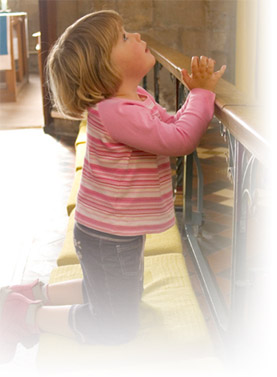Sunday Sermon for October 12, 2014, the Twenty Eighth Sunday in Ordinary Time, Year A
Readings: Is 25:6-10a; Phil 4:12-14, 19-20; Mt 22:1-14
In the first reading today God tells us through the Prophet Isaiah that He will destroy the veil that veils all people; He will destroy death forever. He says that this will take place on His holy mountain. This can be understood in two ways.
The first way to understand this is that the mountain is that know as Zion, in other words, the mountain where Jerusalem is built. It was on this mountain that Abraham took Isaac when he was going to offer his son to the Lord. Instead, God intervened and provided a ram for the sacrifice. Along the way to the mountain, Isaac had asked about the sacrifice and Abraham answered that God would provide Himself a sacrifice. This word order does not sound like very good English, but it is not only correct, but of extreme importance. The most common reading of the statement is that God Himself will provide the sacrifice. This has a very different connotation.
The second way to understand this is by looking at the explanation given by the Prophet Daniel of the vision of Nebuchadnezzar of the statue made of gold, silver, bronze and a mixture of iron and clay. The king saw a stone which had been hewn from a mountain without human intervention. The stone destroyed the statue and grew to be a mountain that filled the whole world. The Prophet said that the statute represented four universal kingdoms which would be destroyed and that a new Kingdom would arise that would fill the whole world. That stone, that mountain, that Kingdom is Jesus.
Since our Lord destroyed death on the mountain where Jerusalem is built the reading can be understood either way because they both point to Jesus on Calvary. However, we have to consider the implications of this for ourselves. We know that our Lord has destroyed death and has opened for us the way to eternal life. Unfortunately, it seems that fewer and fewer people seem to care about this fact.
Jesus said at the end of the Gospel reading today that many are invited but few are chosen. We have to make a choice, a radical choice. I do not suspect that there are many reading this article, or in the pews on Sunday morning, who would choose hell and death over heaven and life if given the option. However, this is not a theoretical question, but a very practical one.
We have been invited by God to the marriage banquet of His Son. In our world today, people are too busy or they have other priorities. The practicalities of this question revolve around the choices we make. We might think from the Gospel reading that the choice is God’s, but in reality it is ours. Do we choose to live our lives for the Lord? Are we working to remove from our lives anything that would separate us from the love of God? Do we make Confession a priority?
Sadly, many people have chosen pleasure, greed, selfishness, and other forms of sin over striving to live according to the ways of holiness. If things do not go our way, we whine and complain. The Saints accepted and embraced whatever came their way. St. Paul even states in the second reading that he had learned in every circumstance the secret of being well fed or going hungry, of living in abundance or being in need. His focus was on serving God and he learned to be at peace with everything else because they are all pretty insignificant when compared to Heaven.
3500 years ago Moses presented the people of Israel with two choices: life or death, the blessing or the curse. He urged them to choose life. Generically and theoretically they did, but their actions spoke otherwise. They gave lip service to God, but their hearts were far from Him.
The same choices are presented to us today; the only difference is that we know even better what life and death mean. It is not about living or dying in this world; it is about eternal life or eternal death, Heaven or hell, Jesus or Satan. Look at the crucifix and see the price that was paid for you to have the opportunity to make this radical choice.
God has invited many, but few, according to our Lord, make the choice to come to the banquet. That choice is not made at the moment of death, it is made daily throughout this life. We know that death has been defeated and we know the means by which it was done. Are we going to take the rough and narrow road through Calvary to eternal life or slide easily down the wide and smooth path that leads to death? We have been invited; the choice is ours.
Fr. Altier’s column appears regularly in The Wanderer, a national Catholic weekly published in St. Paul, Minn. For information about subscribing to The Wanderer, please visit www.thewandererpress.com.

